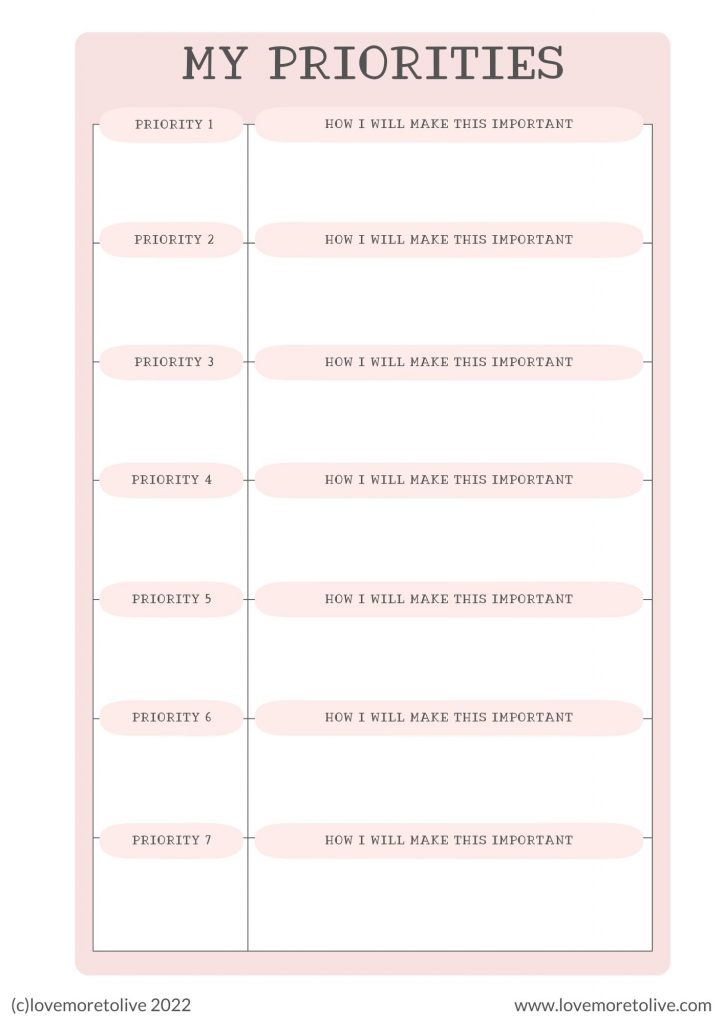How to Prioritise your Life

We all have multiple relationships and tasks to manage and at times it can feel overwhelming trying to meet the demands of life.
Social media bombards us with things we “should” be doing. We get distracted with “bling” that brings no long-term results, and our most important people and tasks get the dregs of our time and energy.
The pace we live at demands that we prioritise or the most important things will be neglected.
Prioritising means valuing one task or aspect of your life over another. It means to prefer, to give precedence to something.
The Bible encourages us to prioritise:
“Seek ye first the kingdom of God and His righteousness, and all these things shall be added unto you.” Matthew 6:33 KJV
This is the ultimate and best priority – putting God first. When we do this, all the other things will fall into place.
But what about the rest of your life?
Why you should prioritise your life
First, let’s look at why you should prioritise your life. When you prioritise your life, you will
- Be more productive with less stress
- Have time for what’s most important to you
- Be more fulfilled as a person
If you don’t prioritise your life, you will spend time on things that are not important, leaving the important things for crisis management.
Not good.
How to prioritise your life
Here are some practical ways to figure out your priorities and make time for them.
Analyse how you spend your time
Your schedule reveals your priorities.
Keep a daily record of how you spend your time for one week. This will help you see where your minutes and hours are going, and give you the motivation to put first things first.
Related: 2 Morning routines that boost productivity
Decide what’s most important
Write down what is most important to you.
Use this worksheet to write down your most important priorities.
Here’s a suggested list of what should be most important to you: (in order of importance)
- God – without God, all prioritising loses its power
- Your spouse – your spouse is your nearest “neighbour” and deserves your quality attention. Do not put your kids before your spouse long-term.
- Your kids – they are your most important work
- Your home – creating the environment for happy family times and character development
- Work – comes before others because it provides for your family
- Yourself – This includes things like mental, spiritual and emotional health, self-improvement, stress management etc
- Others – extended family, friends, ministry
Plan your life
Your schedule – the use of your time – reveals your priorities. Prioritise your most important people and tasks by creating time for them in your schedule.
If your marriage is top of the list, then schedule time for dates with your spouse.
If your children are important to you, then don’t fill your days with social activities, or church functions that take you away from them.
If your relationship with God is high on your list, do you spend time with Him every day?
“What is heaviest must weigh heaviest.” – Dutch Proverb
Related: Time management for Christians
Get your FREE productivity guide by filling in the form below.
Eliminate distractions
Learn to say no to things that will crowd out your priorities. These may well be good things.
“We must say no not only to things which are wrong and sinful, but to things pleasant, profitable, and good which would hinder and clog our grand duties and our chief work.”
C A Stoddards
Say no to the good so you have time for the best.
Reflect, evaluate, adjust
John Maxwell recommends setting aside time for reflection at the end of every day (between 10 and 30 minutes), an hour or two every week, part of a day several times a year (half a day), and an extended time annually (as little as a day and as much as a week). How Successful People Grow, 36
Take time to reflect on your life and evaluate your priorities. Use the following questions to help you:
- Is my schedule working?
- Do I have time for the most important people and tasks in my life?
- What should I eliminate?
- What should I adjust?
- What are my stress levels like?
- Am I working from rest or to rest?
- What should I stop doing?
- What should I do more of?
- Am I a plus or a minus in my most important relationships?
- How can I serve the people I love better?
- Who or what in my life should be receiving more of my time?
Write these questions out and then write out the answers. Why? John Maxwell says, “Because what you think after you write the answer will be different from what you thought before you wrote it. Writing helps you to discover what you truly know, think, and believe.” Ibid 34
In summary, “The greater the proportion of your day – of your life – spent hidden in quiet, in reflection, in prayer, in study, in scheduling, in preparation, the greater will be the effectiveness, the impact, the power, of the part of your life that shows.” Ray and Anne Ortlund, The Best Half of Life, pg 79
Prioritising your life will make you more effective and productive, reduce stress, increase your fulfilment, and help you build sound relationships with your loved ones.
“To every thing there is a season, and a time for every purpose under the heaven.” Ecclesiastes 3:1
What do you need to prioritise? How are you going to make time for the most important things and people in your life?




Leave A Comment